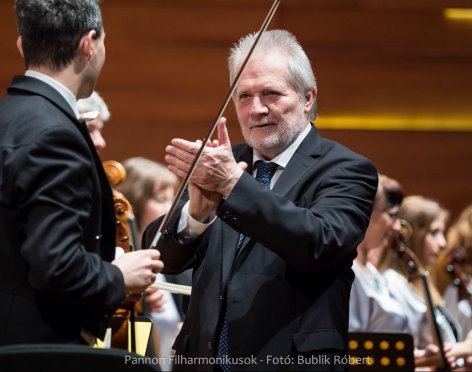On 25 March, at 8 pm, with the help of live stream technology, both the Hungarian and the international audience can enjoy a concert of prime music-historical significance. Following long-established cooperation, composer, conductor and music educator Peter Eötvös - whose accomplishments have been recognised, among others, with the Order of Saint Stephen and the Kossuth Prize - has dedicated a composition of his to the Pannon Philharmonic. On the master's request, the work's world premiere will take place in the Kodály Centre in Pécs. Eötvös is one of the most acclaimed contemporary composers of this century; he is a returning guest conductor of highly prestigious orchestras, so much so that the greatest ensembles of various continents have been looking forward to working with him. This production is an auspicious event in the world of music internationally, in Hungary and in the city of Pécs. It is all the more unique, as the orchestra is preparing for the world premiere with live stream technology. We can be part of a singular experience, as the event will also encompass an interview: the night's programme will be enriched with a discussion with the composer, Peter Eötvös and the musicologist, Gergely Fazekas.
It is always a heart-warming sensation to see when a contemporary fellow-Hungarian slowly secures his place among the nation's great. We can bear witness to this - also in a professional sense -, when we can listen to the premiere of Peter Eötvös's new composition in the company of Béla Bartók's world-famous Music for Strings, Percussions and Celeste. You are most welcome to join us, even if you find contemporary music “difficult”, as a discussion will precede the concert. Through it, we will get to know Peter Eötvös not only as a composer and a conductor but also as a profound thinker. As a little foretaste for the event, let us evoke the master’s thoughts on his new composition: “For millennia, sirens - killer birds with women's heads - have been the most famous singers in mythology. My composition "Sirens' Song" was inspired by three authors. According to Homer, the sirens seduced sailors with their bewitching song and then killed them. Ulysses cautiously puts wax in his ears so that he can lay eyes on but cannot hear them. Kafka suggests that the sirens cunningly fooled Ulysses because they refused to sing for him, anyway. The sirens are the muses of the underworld. Not only Joyce did they seduce but also all composers who have tried to make audible what Ulysses could never hear.”
The night’s programme is made even more exquisite through the discussion with composer and conductor, Peter Eötvös and musicologist, Gergely Fazekas.




































